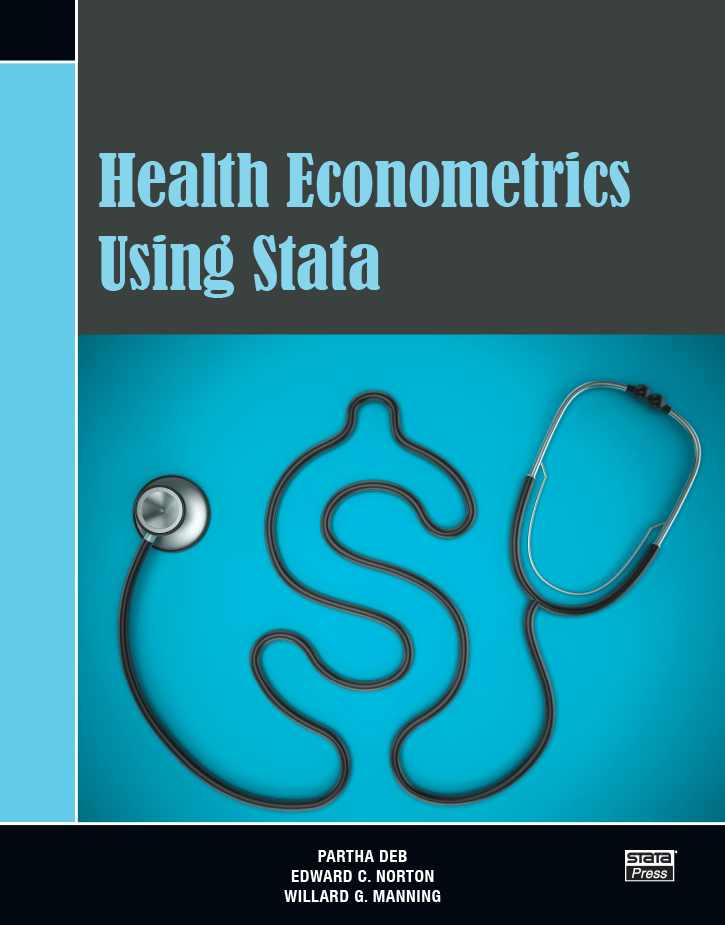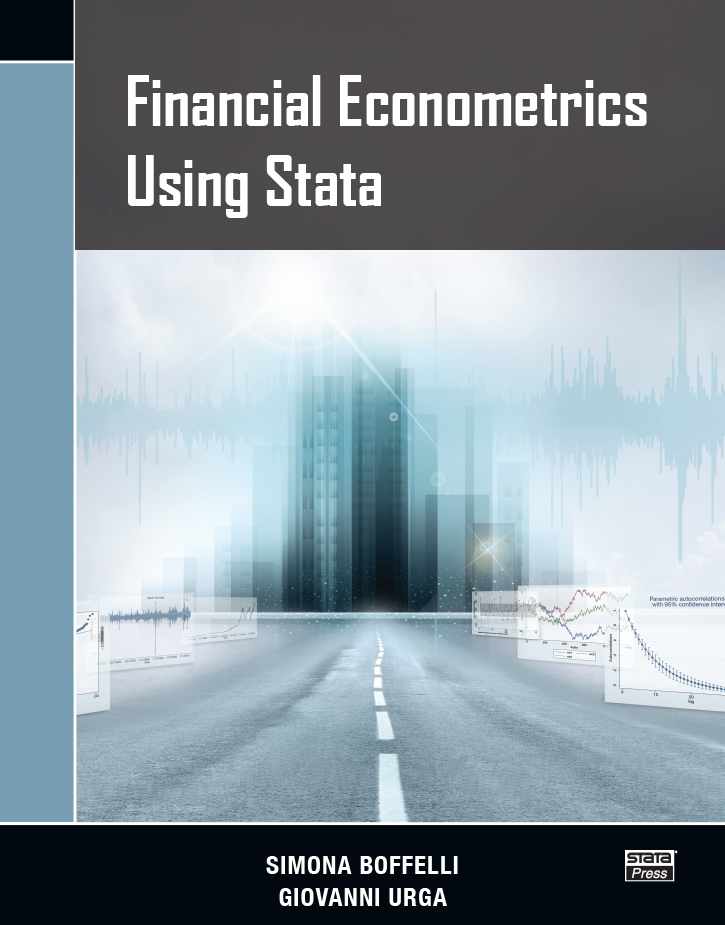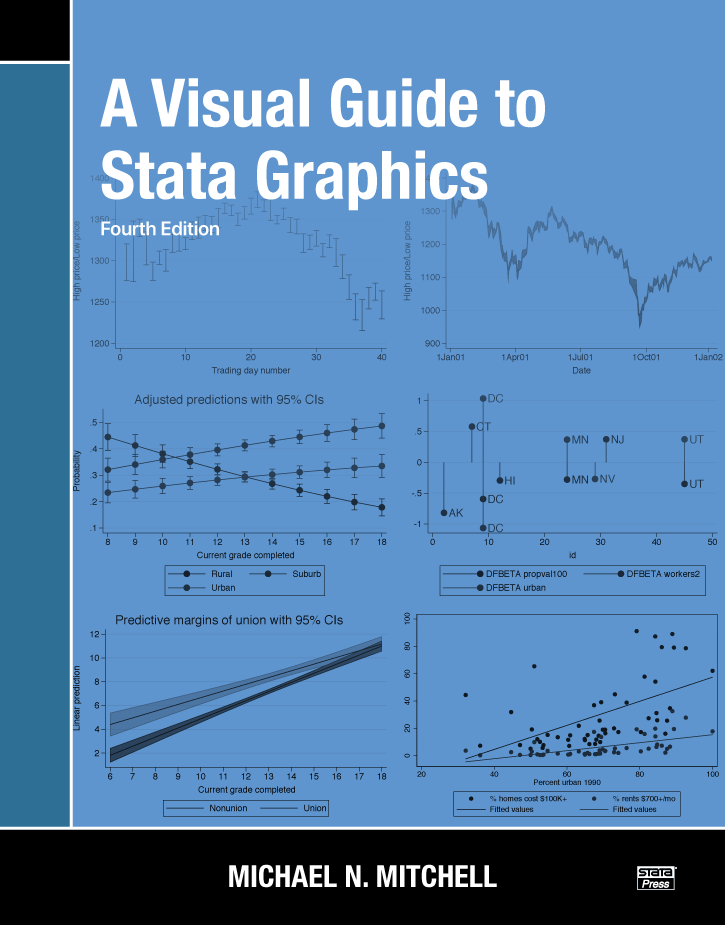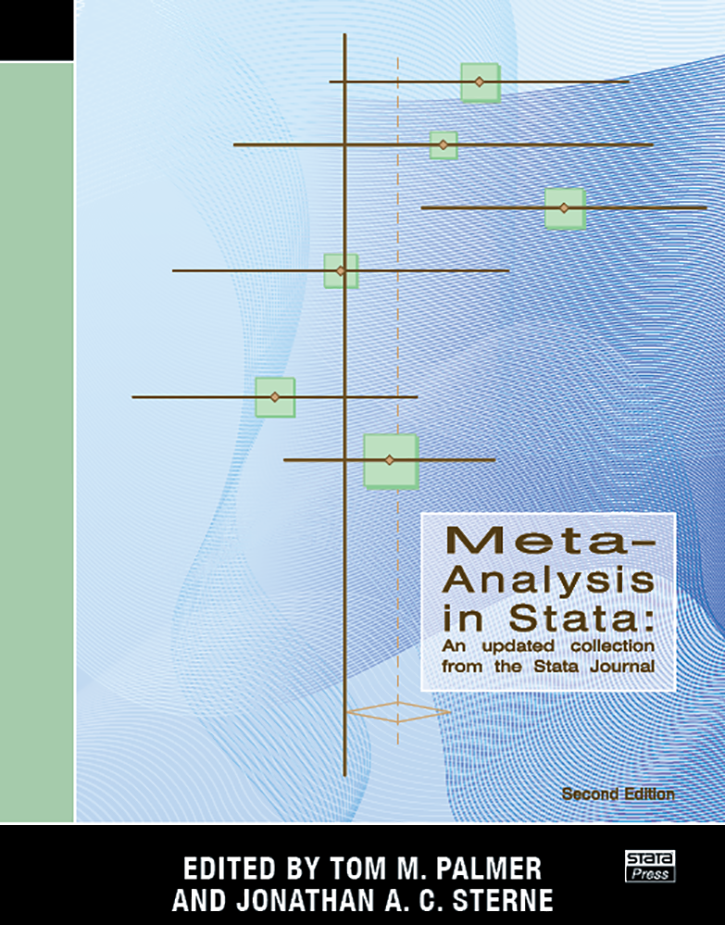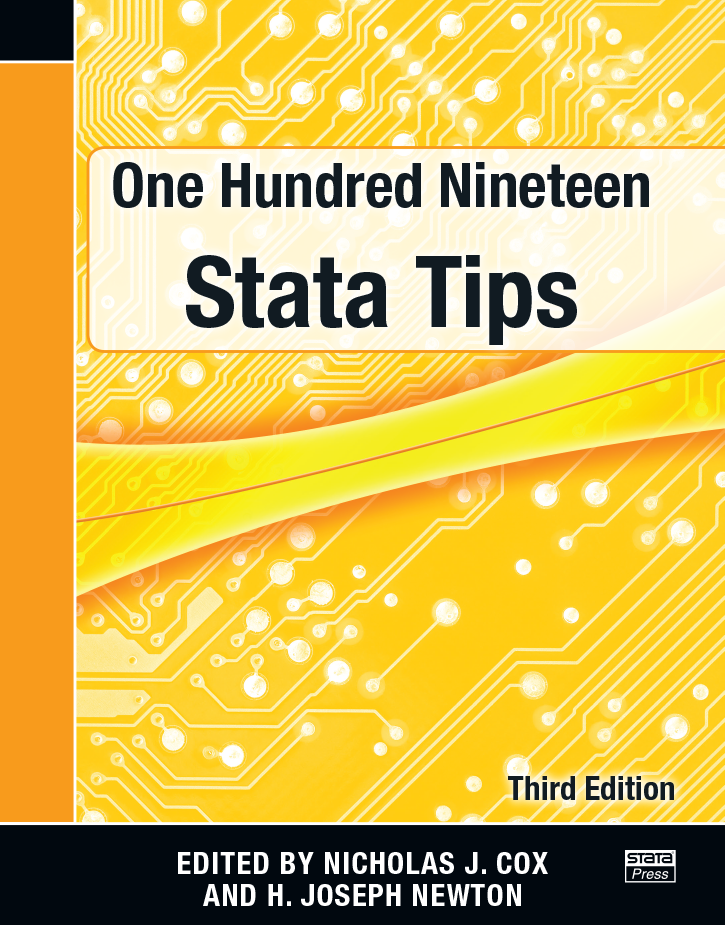
One Hundred Nineteen Stata Tips, Third Edition
0 reviews
52,500원 42,000원
By: Nicholas J. Cox and H. Joseph Newton (editors) Publisher: Stata Press Copyright: 2014 ISBN-13: 978-1-59718-143-3 Pages: 326; paperback
One Hundred Nineteen Stata Tips provides concise and insightful notes about commands, features, and tricks that will help you obtain a deeper understanding of Stata. The book comprises the contributions of the Stata community that have appeared in the Stata Journal since 2003.
-
Editors’ preface (PDF)
Introducing Stata tips
Stata tip 1: The eform() option of regress, R. Newson
Stata tip 2: Building with floors and ceilings, N. J. Cox
Stata tip 3: How to be assertive, W. Gould
Stata tip 4: Using display as an online calculator, P. Ryan
Stata tip 5: Ensuring programs preserve dataset order, R. Newson
Stata tip 6: Inserting awkward characters in the plot, N. J. Cox
Stata tip 7: Copying and posting under Windows, S. Driver and P. Royston
Stata tip 8: Splitting time-span records with categorical time-varying covariates, B. Jann
Stata tip 9: Following special sequences, N. J. Cox
Stata tip 10: Fine control of axis title positions, P. Ryan and N. Winter
Stata tip 11: The nolog option with maximum-likelihood modeling commands, P. Royston
Stata tip 12: Tuning the plot region aspect ratio, N. J. Cox
Stata tip 13: generate and replace use the current sort order, R. Newson
Stata tip 14: Using value labels in expressions, K. Higbee
Stata tip 15: Function graphs on the fly, N. J. Cox
Stata tip 16: Using input to generate variables, U. Kohler
Stata tip 17: Filling in the gaps, N. J. Cox
Stata tip 18: Making keys functional, S. Driver
Stata tip 19: A way to leaner, faster graphs, P. Royston
Stata tip 20: Generating histogram bin variables, D. A. Harrison
Stata tip 21: The arrows of outrageous fortune, N. J. Cox
Stata tip 22: Variable name abbreviation, P. Ryan
Stata tip 23: Regaining control over axis ranges, N. Winter
Stata tip 24: Axis labels on two or more levels, N. J. Cox
Stata tip 25: Sequence index plots, U. Kohler and C. Brzinsky-Fay
Stata tip 26: Maximizing compatibility between Macintosh and Windows, M. S. Hanson
Stata tip 27: Classifying data points on scatter plots, N. J. Cox
Stata tip 28: Precise control of dataset sort order, P. Schumm
Stata tip 29: For all times and all places, C. H. Franklin
Stata tip 30: May the source be with you, N. J. Cox
Stata tip 31: Scalar or variable? The problem of ambiguous names, G. I. Kolev
Stata tip 32: Do not stop, S. P. Jenkins
Stata tip 33: Sweet sixteen: Hexadecimal formats and precision problems, N. J. Cox
Stata tip 34: Tabulation by listing, D. A. Harrison
Stata tip 35: Detecting whether data have changed, W. Gould
Stata tip 36: Which observations?, N. J. Cox
Stata tip 37: And the last shall be first, C. F. Baum
Stata tip 38: Testing for groupwise heteroskedasticity, C. F. Baum
Stata tip 39: In a list or out? In a range or out?, N. J. Cox
Stata tip 40: Taking care of business, C. F. Baum
Stata tip 41: Monitoring loop iterations, D. A. Harrison
Stata tip 42: The overlay problem: Offset for clarity, J. Cui
Stata tip 43: Remainders, selections, sequences, extractions: Uses of the modulus, N. J. Cox
Stata tip 44: Get a handle on your sample, B. Jann
Stata tip 45: Getting those data into shape, C. F. Baum and N. J. Cox
Stata tip 46: Step we gaily, on we go, R. Williams
Stata tip 47: Quantile–quantile plots without programming, N. J. Cox
Stata tip 48: Discrete uses for uniform(), M. L. Buis
Stata tip 49: Range frame plots, S. Merryman
Stata tip 50: Efficient use of summarize, N. J. Cox
Stata tip 51: Events in intervals, N. J. Cox
Stata tip 52: Generating composite categorical variables, N. J. Cox
Stata tip 53: Where did my p-values go?, M. L. Buis
Stata tip 54: Post your results, P. Van Kerm
Stata tip 55: Better axis labeling for time points and time intervals, N. J. Cox
Stata tip 56: Writing parameterized text files, R. Gini
Stata tip 57: How to reinstall Stata, W. Gould
Stata tip 58: nl is not just for nonlinear models, B. P. Poi
Stata tip 59: Plotting on any transformed scale, N. J. Cox
Stata tip 60: Making fast and easy changes to files with filefilter, A. R. Riley
Stata tip 61: Decimal commas in results output and data input, N. J. Cox
Stata tip 62: Plotting on reversed scales, N. J. Cox and N. L. M. Barlow
Stata tip 63: Modeling proportions, C. F. Baum
Stata tip 64: Cleaning up user-entered string variables, J. Herrin and E. Poen
Stata tip 65: Beware the backstabbing backslash, N. J. Cox
Stata tip 66: ds—A hidden gem, M. Weiss
Stata tip 67: J() now has greater replicating powers, N. J. Cox
Stata tip 68: Week assumptions, N. J. Cox
Stata tip 69: Producing log files based on successful interactive commands, A. R. Riley
Stata tip 70: Beware the evaluating equal sign, N. J. Cox
Stata tip 71: The problem of split identity, or how to group dyads, N. J. Cox
Stata tip 72: Using the Graph Recorder to create a pseudograph scheme, K. Crow
Stata tip 73: append with care!, C. F. Baum
Stata tip 74: firstonly, a new option for tab2, R. G. Gutierrez and P. A. Lachenbruch
Stata tip 75: Setting up Stata for a presentation, K. Crow
Stata tip 76: Separating seasonal time series, N. J. Cox
Stata tip 77: (Re)using macros in multpile do-files, J. Herrin
Stata tip 78: Going gray gracefully: Highlighting subsets and downplaying substrates, N. J. Cox
Stata tip 79: Optional arguments to options, N. J. Cox
Stata tip 80: Constructing a group variable with specified group sizes, M. Weiss
Stata tip 81: A table of graphs, M. L. Buis and M. Weiss
Stata tip 82: Grounds for grids on graphs, N. J. Cox
Stata tip 83: Merging multilingual datasets, D. L. Golbe
Stata tip 84: Summing missings, N. J. Cox
Stata tip 85: Looping over nonintegers, N. J. Cox
Stata tip 86: The missing() function, B. Rising
Stata tip 87: Interpretation of interactions in nonlinear models, M. L. Buis
Stata tip 88: Efficiently evaluating elastics with the margins command, C. F. Baum
Stata tip 89: Estimating means and percentiles following multiple imputation, P. A. Lachenbruch
Stata tip 90: Displaying partial results, M. Weiss
Stata tip 91: Putting unabbreviated varlists into local macros, N. J. Cox
Stata tip 92: Manual implementation of permutations and bootstraps, L. Ãngquist
Stata tip 93: Handling multiple y axes on twoway graphs, V. Wiggins
Stata tip 94: Manipulation of prediction parameters for parametric survival regression models, T. Boswell and R. G. Gutierrez
Stata tip 95: Estimation of error covariances in a linear model, N. J. Horton
Stata tip 96: Cube roots, N. J. Cox
Stata tip 97: Getting at ρ's and σ's, M. L. Buis
Stata tip 98: Counting substrings withing strings, N. J. Cox
Stata tip 99: Taking extra care with encode, C. Schechter
Stata tip 100: Mata and the case of the missing macros, W. Gould and N. J. Cox
Stata tip 101: Previous but different, N. J. Cox
Stata tip 102: Highlighting specific bars, N. J. Cox
Stata tip 103: Expressing confidence with gradations, U. Kohler and S. Eckman
Stata tip 104: Added text and title options, N. J. Cox
Stata tip 105: Daily dates with missing days, S. J. Samuels and N. J. Cox
Stata tip 106: With or without reference, M. L. Buis
Stata tip 107: The baseline is now reported, M. L. Buis
Stata tip 108: On adding and constraining, M. L. Buis
Stata tip 109: How to combine variables with missing values, P. A. Lachenbruch
Stata tip 110: How to get the optimal k-means cluster solution, A. Makles
Stata tip 111: More on working with weeks, N. J. Cox
Stata tip 112: Where did my p-values go? (Part 2), M. L. Buis
Stata tip 113: Changing a variable's format: What it does and does not mean, N. J. Cox
Stata tip 114: Expand paired dates to pairs of dates, N. J. Cox
Stata tip 115: How to properly estimate the multinomial probit model with heteroskedastic errors, M. Herrmann
Stata tip 116: Where did my p-values go? (Part 3), M. L. Buis
Stata tip 117: graph combine—Combining graphs, L. Ãngquist
Stata tip 118: Orthogonalizing powered and product terms using residual centering, C. Sauer
Stata tip 119: Expanding datasets for graphical ends, N. J. Cox

